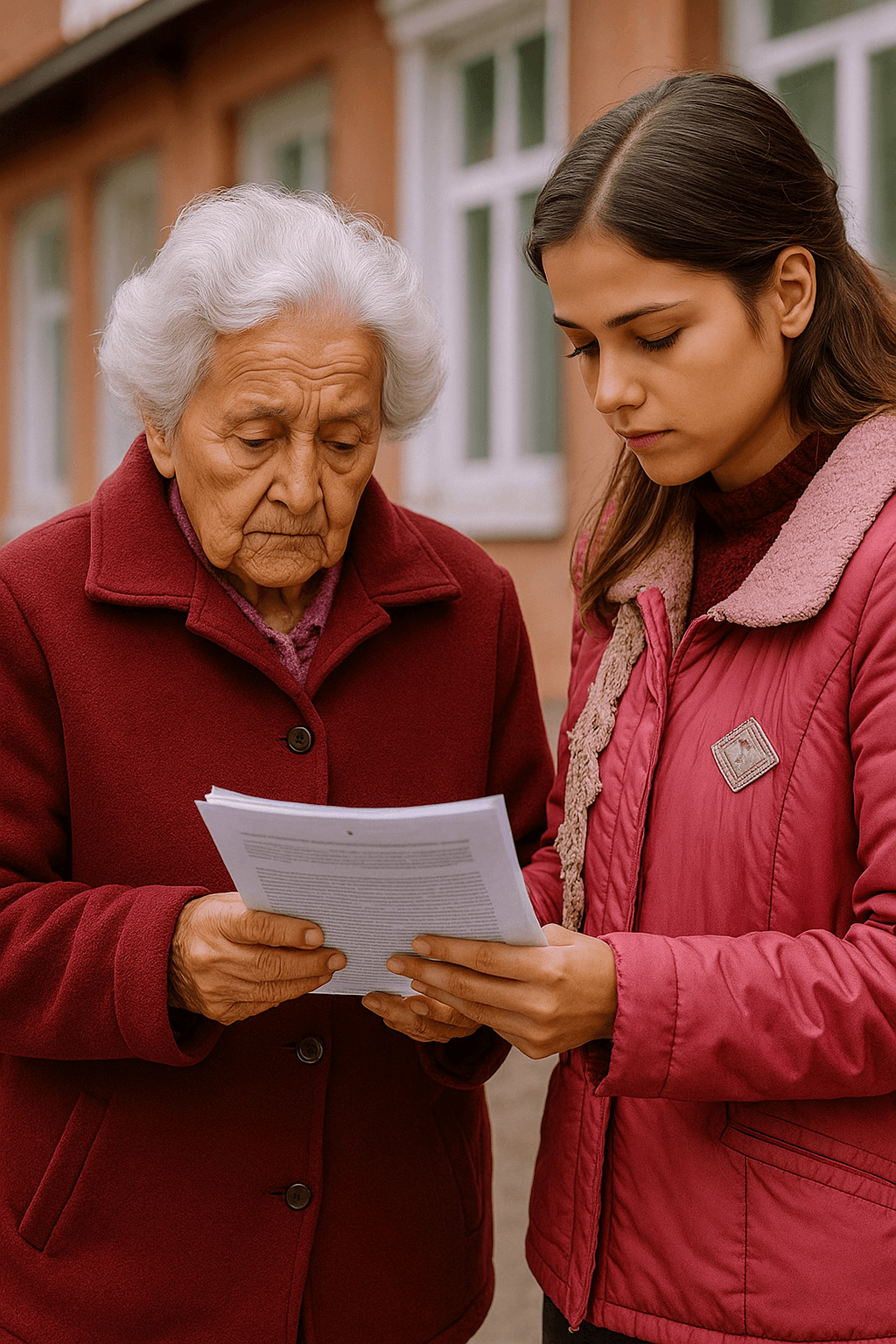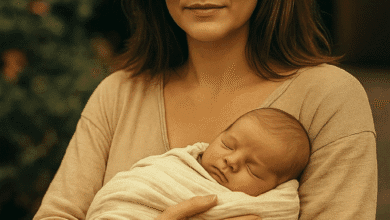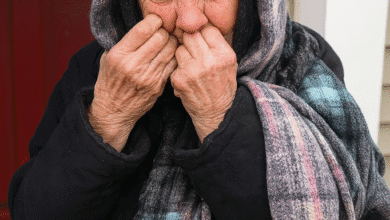My Daughter Sent Me to a Nursing Home

— Without Knowing I Owned the Building. That’s When I Decided to Teach Her a Lesson.
My name is Tamara Alexeyevna. I’m seventy-four years old.
I once had a full life: a loving husband, a job I cherished, a warm home, and three children.
But ten years ago, my husband passed away — his heart simply gave out.
After he left, the house grew silent, and soon, I felt like no one needed me anymore. My children called less and less, and the phone remained quiet.
The one who drifted away the most was my youngest daughter, Irina.
She had always been driven and ambitious, dreaming of a successful career. When she got into a university in the capital, I was overjoyed.
To help her, I gave everything: my savings, my mother’s jewelry — I even sold my father’s old Volga car.
Years went by. Irina got married and had a son.
We saw each other rarely, and spoke even less — she was always in a hurry, cutting conversations short.
Then, one day, after three months of silence, she showed up unexpectedly.
— “Mom, it’s getting hard for you to be alone. It’s time to consider a nursing home,” she said, avoiding my eyes.
— “They’ll take care of you, and you’ll have company and doctors nearby.”
I didn’t say anything. My heart ached, but I had no energy to fight back.
I simply nodded.
The next day, she brought me to a private nursing home on the outskirts of the city.
A modern and beautiful building with gardens and cozy rooms.
Irina quickly signed the papers, gave me a brief goodbye, and left — as if discarding an unnecessary burden.
I sat on a bench and watched the lilac petals fall.
Memories came flooding back: my husband and I had built that very building together. We had saved money for years, believing we’d grow old with dignity. It was our shared dream. Our property.
He had put everything in my name and once told me:
— “Let it stay under your name… just in case the children ever forget about us.”
I walked around the grounds and glanced at the administrative building.
The director — a young man in glasses — smiled warmly and said:
— “Tamara Alexeyevna? What are you doing here? You own this place!”
I nodded. My voice trembled.
He seemed to understand everything instantly.
— “Would you like me to ban your daughter from visiting?”
I smiled bitterly.
— “No. I’ll make a different decision.”
I stayed — not as a resident, but as the owner.
That same night, I gathered the entire staff, told them the truth, and announced that I would personally supervise the living conditions, care, and treatment of every resident.
For the first time in years, I felt I had a reason to live.
Weeks went by. Then, unexpectedly, my grandson came to visit — without Irina.
— “Grandma, I missed you. And Mom… she’s upset you don’t invite us anymore.”
I hugged the boy tightly.
I didn’t want revenge.
My mind was made up: I had chosen to live, to help, to be strong.
When Irina finally tried to visit, she wasn’t allowed in.
The administrator informed her that access was restricted.
She called, wrote, came with her husband — I gave no answer.
One day, I wrote her a letter:
“My dear daughter,
I’m not angry.
You did what you thought was best, believing you were freeing yourself from a burden.
But I began a new life.
I am no longer just an old mother — I am a woman who found purpose again.
Perhaps when you realize your mistake, I will open the door.
But until then… let it stay closed.”
Six months passed.
I now lead art workshops for the grandmothers — we paint, read books, discuss films.
My grandson visits more often, but Irina writes less and less.
I no longer wait for apologies.
I simply live.
And you know, dear reader — for the first time in many years, I feel light and free inside, like a heavy burden has finally been lifted.
A year passed since Irina brought me to that nursing home — not knowing I owned the building.
And in that time, I changed.
I’m no longer the mother who gives everything away.
Nor the woman who silently cries into her pillow.
I am now Tamara Alexeyevna — the owner, the leader, and above all, a woman who found her place in life again.
But one autumn day, the security guard handed me an envelope.
The handwriting was familiar — shaky, slightly uneven.
It was a letter from Irina:
“Mom…
I’m writing this and I can’t believe you’ll ever be able to forgive me.
I told myself I did it for you.
But in truth — it was convenient for me.
Convenient to shift responsibility, to escape guilt and fear and the thought that you were alone.
I thought you were weak. That you’d accept anything.
But now I see — you are stronger than all of us.
Every month, I come to your gates.
I just stand there and watch you smile at others. It hurts.
But I’m also jealous — because you give them what I couldn’t give you: true warmth.
Mom… if one day you can… please let me hug you. Not as your daughter, but as someone who has finally awakened.”
I held the letter in my trembling hands, rereading every line.
Tears — which I hadn’t shed in a year — rolled slowly down my face.
That night, I sat by the window for a long time.
Leaves fell from the trees, just like the lilac petals did on my first day there.
Life seemed to come full circle.
But I still didn’t know if I was ready to let her in again — not into my home, but into my heart.
A week later, a new resident approached me.
She had no one left but memories.
A small, fragile woman with faded eyes sat beside me and asked gently:
— “They told me you’re not just the manager here… but also a kind soul.
May I talk to you?”
We sat together the whole night.
She told me how her daughter abandoned her after she got sick, how her world collapsed.
I listened.
No judgment.
No pity.
Just presence.
Exactly how I once dreamed someone would be there for me.
And that’s when I understood:
Forgiveness is not weakness. It’s a strength — one that must be earned.
In the spring, I wrote a short reply to Irina:
“Come.
No words needed.
Just hug me.
I’ll be waiting.”
She came.
Thinner now, her hair peppered with gray — she looked like a different person.
She stood at the door like a child, nervously looking around.
I walked to her.
We stood in silence for a long while.
Then she stepped forward and hugged me tightly.
— “I’m sorry, Mom… I thought I was an adult. But now I know —
a home isn’t a career, or a husband…
It’s you. Only you.”
I didn’t respond.
I just stroked her back.
Sometimes, the most meaningful things are said through silence and a hug.
Since then, Irina visits every week.
Not as a guest, but as a beloved daughter.
She helps out, brings books, bakes pies for the residents.
And in her eyes, I see again the little girl whose braids I once tied with ribbons.
Three months later, she returned with my grandson:
— “Mom… we want you to come back home. The house is waiting.
We’ve thought a lot… and if you agree, we’ll learn how to be a family again.”
I smiled gently:
— “I don’t want to go back, Ira.
Here, I found myself.
But I want to be close — not as a burden, but as an equal.”
And we hugged.
No pain.
No resentment.
Just love.





